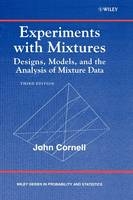
Experiments with Mixtures
Designs, Models, and the Analysis of Mixture Data
Seiten
2002
|
3rd edition
John Wiley & Sons Inc (Verlag)
978-0-471-39367-2 (ISBN)
John Wiley & Sons Inc (Verlag)
978-0-471-39367-2 (ISBN)
With this comprehensive book, readers will learn how to design and set up mixture experiments and then analyze the data and draw inferences from the results. The third edition incorporates in-depth information from over 73 articles, covering the developments of the past decade.
The most comprehensive, single-volume guide to conductingexperiments with mixtures
"If one is involved, or heavily interested, in experiments onmixtures of ingredients, one must obtain this book. It is, as wasthe first edition, the definitive work."
-Short Book Reviews (Publication of the International StatisticalInstitute)
"The text contains many examples with worked solutions and with itsextensive coverage of the subject matter will prove invaluable tothose in the industrial and educational sectors whose work involvesthe design and analysis of mixture experiments."
-Journal of the Royal Statistical Society
"The author has done a great job in presenting the vitalinformation on experiments with mixtures in a lucid and readablestyle. . . . A very informative, interesting, and useful book on animportant statistical topic."
-Zentralblatt fur Mathematik und Ihre Grenzgebiete
Experiments with Mixtures shows researchers and students how todesign and set up mixture experiments, then analyze the data anddraw inferences from the results. Virtually every technique thathas appeared in the literature of mixtures can be found here, andcomputing formulas for each method are provided with completelyworked examples. Almost all of the numerical examples are takenfrom real experiments. Coverage begins with Scheffe latticedesigns, introducing the use of independent variables, and endswith the most current methods. New material includes:
* Multiple response cases
* Residuals and least-squares estimates
* Categories of components: Mixtures of mixtures
* Fixed as well as variable values for the major componentproportions
* Leverage and the Hat Matrix
* Fitting a slack-variable model
* Estimating components of variances in a mixed model using ANOVAtable entries
* Clarification of blocking mates and choice of mates
* Optimizing several responses simultaneously
* Biplots for multiple responses
The most comprehensive, single-volume guide to conductingexperiments with mixtures
"If one is involved, or heavily interested, in experiments onmixtures of ingredients, one must obtain this book. It is, as wasthe first edition, the definitive work."
-Short Book Reviews (Publication of the International StatisticalInstitute)
"The text contains many examples with worked solutions and with itsextensive coverage of the subject matter will prove invaluable tothose in the industrial and educational sectors whose work involvesthe design and analysis of mixture experiments."
-Journal of the Royal Statistical Society
"The author has done a great job in presenting the vitalinformation on experiments with mixtures in a lucid and readablestyle. . . . A very informative, interesting, and useful book on animportant statistical topic."
-Zentralblatt fur Mathematik und Ihre Grenzgebiete
Experiments with Mixtures shows researchers and students how todesign and set up mixture experiments, then analyze the data anddraw inferences from the results. Virtually every technique thathas appeared in the literature of mixtures can be found here, andcomputing formulas for each method are provided with completelyworked examples. Almost all of the numerical examples are takenfrom real experiments. Coverage begins with Scheffe latticedesigns, introducing the use of independent variables, and endswith the most current methods. New material includes:
* Multiple response cases
* Residuals and least-squares estimates
* Categories of components: Mixtures of mixtures
* Fixed as well as variable values for the major componentproportions
* Leverage and the Hat Matrix
* Fitting a slack-variable model
* Estimating components of variances in a mixed model using ANOVAtable entries
* Clarification of blocking mates and choice of mates
* Optimizing several responses simultaneously
* Biplots for multiple responses
JOHN CORNELL is a professor in the Department of Statistics, University of Florida, Gainesville.
Preface to the Third Edition.
Preface to the Second Edition.
Introduction.
The Original Mixture Problem: Designs and Models for Exploring theEntire Simplex Factor Space.
The Use of Independent Variables.
Multiple Constraints on the Component Proportions.
The Analysis of Mixture Data.
Other Mixture Model Forms.
The Inclusion of Process Variables in Mixture Experiments.
Additional Topics.
Matrix Algebra, Least Squares, and the Analysis of Variance.
Data Sets from Mixture Experiments with Partial Solutions.
Bibliography and Index of Authors.
Answers to Selected Questions.
Appendix.
Index.
| Erscheint lt. Verlag | 22.2.2002 |
|---|---|
| Reihe/Serie | Wiley Series in Probability and Statistics |
| Zusatzinfo | Tables: 160 B&W, 0 Color; Graphs: 133 B&W, 0 Color |
| Verlagsort | New York |
| Sprache | englisch |
| Maße | 165 x 240 mm |
| Gewicht | 1107 g |
| Themenwelt | Mathematik / Informatik ► Mathematik ► Angewandte Mathematik |
| Naturwissenschaften ► Chemie | |
| ISBN-10 | 0-471-39367-3 / 0471393673 |
| ISBN-13 | 978-0-471-39367-2 / 9780471393672 |
| Zustand | Neuware |
| Haben Sie eine Frage zum Produkt? |
Mehr entdecken
aus dem Bereich
aus dem Bereich
Buch | Hardcover (2012)
Westermann Schulbuchverlag
34,95 €
Schulbuch Klassen 7/8 (G9)
Buch | Hardcover (2015)
Klett (Verlag)
30,50 €
Buch | Softcover (2004)
Cornelsen Verlag
25,25 €


